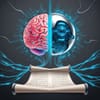The relationship between the human brain and artificial intelligence (AI) is complex and fascinating. While AI has made tremendous progress in recent years, it's still unclear whether it can truly surpass human intelligence. The human brain is a biological entity with unparalleled adaptability, creativity, and emotional intelligence, whereas AI is an artificial system that excels in logic and computation.
One of the most striking differences between the human brain and AI is energy efficiency. The human brain operates on around 20 watts of power, comparable to a dim lightbulb, whereas training an advanced AI model can consume thousands of kilowatts. Additionally, humans learn from experience, adapt to new situations, and possess a vast range of emotions that influence decision-making, whereas AI systems rely on data and algorithms.
Researchers believe that cracking the neural code, or understanding how the brain encodes sensory information, is key to building human-level AI. This could enable AI to emulate visual thinking and potentially even consciousness. Some experts argue that humans are set to engineer superior intelligence with greater capacity and speed than our own brains once we crack the neural code.
The human brain's ability to learn with limited data, adapt to new situations, and understand complex contexts is unmatched by AI. While AI excels in specific domains like image recognition and language translation, it lacks the general intelligence and common sense understanding that humans possess. Potential applications of AI include assisting doctors, predicting market trends, and generating content, but human intuition, creativity, and emotional intelligence are essential for giving these applications meaning and context.
The future of AI and human brains is likely to be one of collaboration and mutual enhancement, rather than competition. By understanding the strengths and limitations of both, we can unlock new possibilities and create a future where technology augments human capabilities and solves complex problems. As researchers strive to build more human-like artificial intelligence, it's essential to prioritize responsible AI development, ensuring that AI benefits society as a whole.


